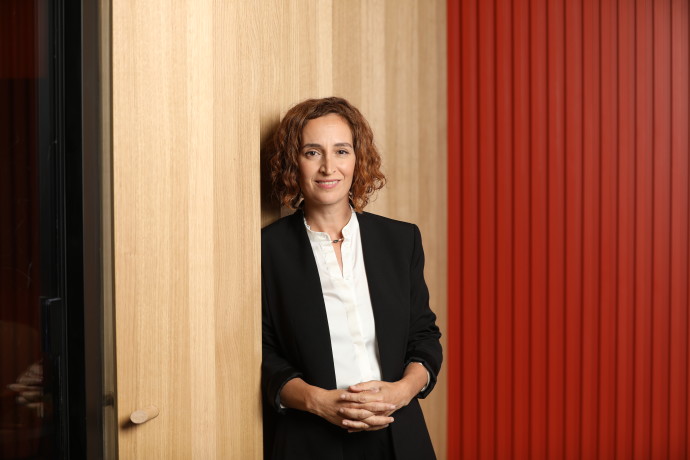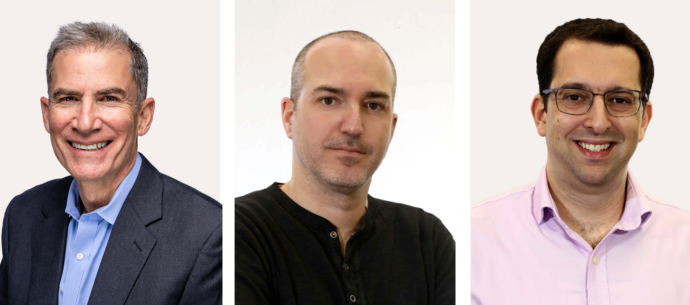We’ve made an impact and are changing something in the world,” says Eynat Guez, CEO and co-founder of Papaya Global, a Tel Aviv-based payroll and payments software company. “I think this is a huge win for everyone.”
Perhaps nothing better epitomizes Israel’s standing as the Start-Up Nation than the fact that Papaya Global was named to the TIME100 list of the most influential companies of 2023. Papaya simplifies payroll, payments, and workforce management by helping companies hire, onboard, manage, and pay employees globally.
Papaya Global has transformed traditional international payroll and payments management by developing a unified platform that streamlines processes and delivers cross-company connectivity. This innovation is driven by the observation that managing global workforces and multi-country payroll and payments with outdated tools is time-consuming and error-prone, and with the vision of replacing these tools with an end-to-end solution.

The platform manages more than payroll, payments, and HR. It also manages risk by providing full compliance and liability, maximizing efficiency, and creating growth. Papaya Global is the first Israeli unicorn – a term used for a privately held start-up valued at more than $1 billion – to be founded by a woman.
Guez, who co-founded Papaya in 2016 with Ofer Herman and Ruben Drong, was recently interviewed on the "No Limits "podcast series by Maayan Hoffman, deputy CEO of strategy and innovation at The Jerusalem Post; and Gideon Argov, managing partner and co-founder of New Era Capital Partners.
The series features in-depth interviews with CEOs of Israeli start-ups, who share the experiences and challenges of developing successful companies in today’s fast-paced and demanding business environment.

The following interview is based on the transcript of the podcast, which can be found on, Apple Podcasts ,Spotify and google podcasts.
The middle child in a family of three, Eynat Guez immigrated to Israel with her family from Paris at the age of four, and grew up in Netanya. A competitive swimmer as a child, she says that her swimming career influenced her to be fully engaged throughout her business career, no matter the circumstances.
“When you are a competitive swimmer, you spend a great deal of time shaving milliseconds off your time to set your own personal records. You’ll spend as much time as you can in practice to train to be a bit better, even if the improvement is incremental. But you celebrate every achievement because it’s very meaningful.
“I would say that I’m an activist at heart, and I believe if you see something wrong and can help fix it, then it is your responsibility to do so"
“For me, it’s the same when I’m looking at my career and the places where I worked. As long as I feel there is a way of growing, and it’s still creating personal challenges, I am happy to be there.”
She began her business career after completing her IDF service in the Air Force, working for seven years as COO of LR Group, a company that developed projects in Africa. “We did amazing things there in agriculture, telecom, and infrastructure, in unique places that you would probably not visit as a tourist,” she says with a smile. “I was always fascinated by traveling and seeing the world.”
After seven and a half years with LR, Guez, who wanted to start her own business since she was four, decided to do exactly that. She founded Relocation Source, which provides inbound and outbound corporate relocation services to clients.
Four years later, Guez founded yet another company, Expert Source, specializing in helping multinational companies expand their business to China. Though happy living in Asia, Guez began to reflect on her career choices and decided that she wanted to return to her original dream of building a product and company on a large scale. That was when she began to envision Papaya Global.
“The main mission of Papaya,” Guez explains, “is to reinvent the way companies are processing payroll globally, making it easy and seamless to process a global workforce, from onboarding to payroll processing, and payments in a way that makes it almost a ‘no-brainer.’”
Guez relates that Papaya’s first years were challenging. “It was very hard to convince investors to believe in the big vision,” she says. Many potential investors did not think that there was a market for Papaya’s product, which was evidenced by the fact that the company was able to raise less than $5 million in the first two years. In the ensuing two years, she adds, Papaya raised $450 million.
“I think that the one thing that we did well from the very early stages was believing in ourselves, continuing to scale the business, and growing in numbers and results.”
She is as passionate about her work as she is about the company culture that she wants to maintain: “The main thing was to create an environment of diversity in the company from the outset.”
Papaya maintains a 50% balance between men and women employees throughout all levels of the company, and employs individuals with disabilities, members of minority groups, and workers from many different countries. Guez says that having a diverse group of employees is a great advantage.
“I believe that having a diverse workforce creates challenges for people and opens them up to be better human beings. It’s very easy to collaborate with people who are the same as you. It’s much harder to collaborate with someone who provides you with a personal challenge.”
What interests Guez more than anything is the quality of the personnel at Papaya. “We need to bring great people in, and we need to look above this because that is how we build a strong culture,” she says. “If you bring people who challenge others, eventually we can accept different people from the population, and we can create great success stories.”
Papaya Global currently has 850 employees in 10 global hubs. The fintech powerhouse recently acquired Azimo, a London-based money transfer company that supports its move into more markets while providing additional services, such as remittance services for people working in one country but with families whom they want to pay in another.
While many Israeli companies are eager for an “exit” (being purchased by a global company), Papaya appears to be doing the opposite – it’s an Israeli enterprise that has acquired a company outside Israel.
She relates that Israeli hi-tech leaders need to decide from the outset what type of company they want to build. “If you want to build a company, and eventually the target is to sell it to another company, that’s fine. There is nothing wrong with that, but you need to decide what you want to build.”
Guez and her team thought otherwise about Papaya Global and decided to build a meaningful business, become a market leader, and stand on their own rather than be acquired by an outside company.
“I believe that Papaya can be a $100 billion company,” she predicts. “It’s not going to happen overnight. But I do think that eventually, this domain and the innovation that we bring to [the payroll industry] can make it happen.”
While Guez has spent the better part of the podcast discussing Papaya Global, she cannot ignore the elephant in the room – her vocal and outspoken opposition to the government’s plans for judicial reform. What has prompted her position on this matter?
She is concerned that the current judicial overhaul will negatively affect the business climate in Israel. “I would say that I’m an activist at heart,” she says, “and I believe if you see something wrong and can help fix it, then it is your responsibility to do so. I want to live here, and I want my kids to live here. I want us to ensure that we are doing our best to protect the assets that we have built in this country.”
She credits the growth of Papaya and the Israeli hi-tech market in general over the past several years to the positive business climate in the country. “Our ability to create amazing companies in Israel in the last few years is because the Israeli government made the terms to provide this confidence by not interfering. I don’t think they ever did many active things to support tech, but they did not interfere.”
The majority of the hi-tech community, says Guez, is opposed to the judicial reform, and many hi-tech investors in Israel have expressed similar opposition to the government’s efforts. She adds that her company’s board and investors have supported her efforts.
Guez remains optimistic about Israel, despite the current crisis. “I think that the fundamentals of Israel are extraordinary,” she says. “The fact that Israel has people who are ultra-Orthodox and secular, and that Tel Aviv is considered to be one of the most accepting cities in the world in terms of acceptance of members of the gay community and diversity, and that Arab and Jews, for the most part, can live together, is quite amazing. I think that the only thing Israel needs to do is to keep this freedom of choice.”
For Guez, the most lamentable part of current events is the hatred that has been engendered between groups. “People have tried to paint us (the hi-tech industry) as a group that hates the Orthodox or hates others. We don’t hate anyone. The tech sector was very much involved in diversity and ensuring that we accept everyone.
“We have invested a great deal of time in bringing in more haredim and Arabs and creating a much more accepting environment. Israel needs to be a place of pluralism. People need to be able to live according to their set of values.”
Though she is not a politician, Guez cares deeply about Israel’s future and suggests that caring is what makes Israel special. “I met with someone in the Biden administration, and he said to me, ‘You know what your problem is? You always think about issues from the heart, and you are not pragmatic enough.’
“I said to him, ‘That is not a problem. That is actually the best thing about this country – that we approach issues as a matter of the heart.’ We really like this country. We want to live here, and we want to make it better.”
This article was written in cooperation with Papaya Global.
